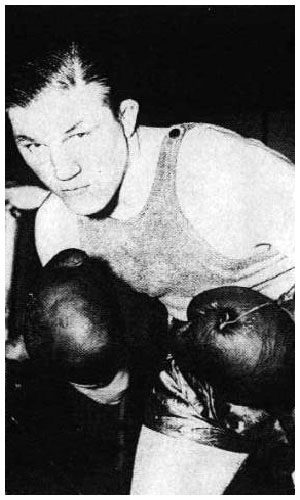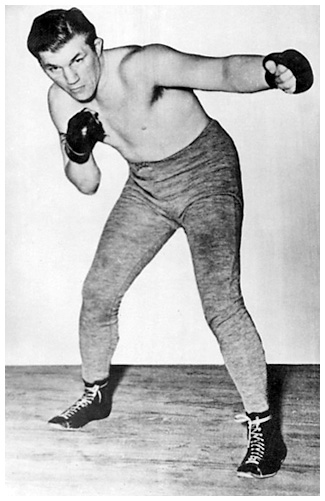
| Tommy Farr | |
Born at Railway Terrace Clydach Vale on the 12th March 1913. Thomas George Farr was the son of George Farr, and one of eight children. His mother died when he was only eight years old and his father when he was eighteen, after a prolonged illness, which had left him paralysed. In common with most children at that time he left school at a young age and went to work in the mines to help support his family. He hated the life of a miner and soon quit, working at series of jobs and suffering 'long nightmares of unemployment' |
 |
After a series of casual ill-paid jobs he returned defeated to Clydach and the family home. During his time in London he managed to secure a fight with Eddie Steele, as a substitute for another welsh boxer who had been injured in training just prior to the fight. Tommy's first fight in London turned out to be a disaster, ending when he leaped out of the ring and ran to the changing room after a punch from Steele caused him to choke on his gumshield. Following on from this he won fights against Max Baer, the former world heavyweight champion and the German boxer Walter Neusel. Tommy was at his peak and signed a contract to fight another former world heavyweight champion, the German Max Schmeling. However before he fulfilled this contract there came another offer, one that was to ensure Tommy Farrs' place in boxing folklore forever, that was a chance to fight the mighty Joe Louis for the World Heavyweight crown. |
|
 |
The fight took place at Yankee Stadium, New York, on August 30th 1937 in front of a crowd of 36,000 spectators. Of the 300 boxing writes at ringside only one gave Tommy any chance of defeating the 'Brown Bomber', writing him off as yet another of Britain's 'horizontal heavyweights'. The excitement in South Wales and particularly the Rhondda reached fever pitch and thousands of locals stayed up to listen to the live broadcast at 3 a.m. local time. Despite nobody outside of his partisan fans giving him a chance Farr took Louis the full fifteen rounds and only lost on points. Louis later described Farr as the toughest fighter he had ever met, and their fight remains part of Welsh sporting folklore, and is widely regarded as one of the greatest boxing matches of all time. |